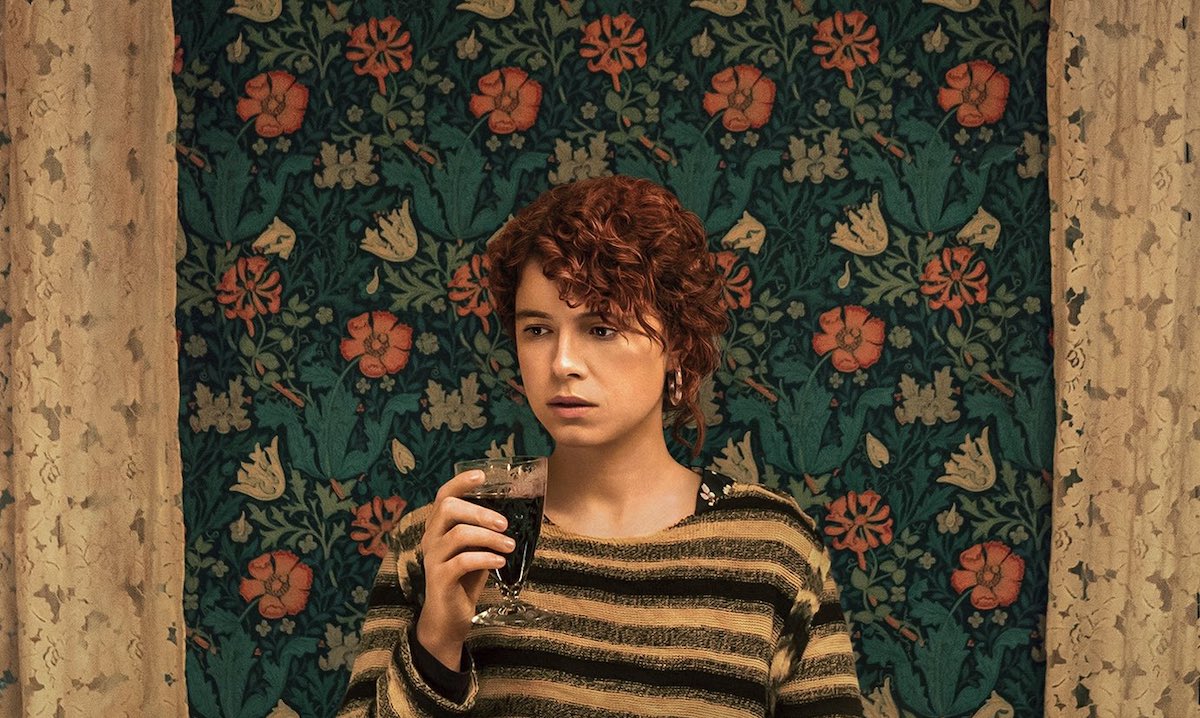The avant garde writer and director Charlie Kaufman (“Adaptation” 2002, “Being John Malkovich” 1999) has a new project, “I’m Thinking of Ending Things” which may be one of his most challenging and haunting films to date as he adapts Ian Reid’s book of the same name. Feeling more like a stage play than a film, Kaufman takes the essential elements of story telling and burns the images from dialogue into our minds to create a visceral and evocative film.
The stage is set in the front seat of a car where an unnamed woman (Jessie Buckley) and Jake (Jesse Plemons), a young couple, drives in inclement weather to Jake’s parents’ farmhouse. We are immediately taken inside of the woman’s mind, privy to her deep thoughts and judgments about her possibly new but seemingly unfulfilling relationship with Jake. Her insights are often poetic and then abruptly interrupted by conversational attempts from Jake. He has a calm demeanor, a soft but insightful voice and together the pull you into their world as if wrapped in a warm and snuggly blanket. We hear their conversations and more importantly, we hear her intrinsic commentary as she contemplates ending “it.”
The dialogue allows us to begin to get a grasp as to who these young people are, but just as we think we know their background, the story takes a sharp left turn and we find ourselves unable to put our finger on who they are. And just as you wonder if the entire film is going to be one long conversation about life, literary references, and meeting the folks for the first time as the young woman is warned about the mother’s illness with the bar of expectations set exceptionally low, we arrive at the farm. The eeriness and strange actions and reactions ramp up making it feel more like a horror movie as they tour a barn, serenaded by horrific stories of life (and death) on a farm. Inside, as we await the parents to make a grand entrance from the second floor, Jake and the woman engage in uncomfortable fits and starts of awkward verbal exchanges.
Jimmy the dog appears out of nowhere, incessantly shaking off water followed by Mom (Toni Collette) and Dad (David Thewlis) making a splash. The young woman, strong and independent, is taken aback by Jake’s parents’ comments and outlooks. His mother is a strange bird with her insipid comments and confusions which drive Jake nuts. Dad, a bit more subdued, is odd as well and both parents have little respect for their son and his life’s choices. The subsequent observations following dinner make us question not only where we are but when we are. The young woman questions her own sense of reality and identity with the answers arriving only at the very end of the film.
“I’m thinking of Ending Things,” without giving too much away, takes us on an unexpected journey of looking back on life’s choices filled with regrets and unreached potential. The eloquence with which each of our main characters portrays their unique and ever-changing perspectives is like listening to a symphonic harmony; complex and beautiful. Our mind’s eye is always in clear focus looking back, but our wants and desires blur the lines of reality as it melds together what was and what could have been. The end of the film confirms your suspicions as it leaves you breathless and tears slowly rolling down your face.
The young woman, dressed in a way that could have been from any era with Jake’s wardrobe equally non-identifying, only gives us a hint at being in today’s world with her iPhone. Her manner is defiant as she states her mind, never succumbing to Jake’s explosions or his parents’ judgmental behavior, but her inconsistencies in her background give us the first of many clues that something is amiss. Kaufman never underscores these inconsistencies in dialogue or visual contradictions as he expects, or perhaps demands, the viewer to work for it and figure out the riddle.
And this is one intricate riddle to solve as both Plemons and Buckley recite pages of individual dialogue resembling more of a soliloquy which gives it a stage production feel. The literary choices and cultural references are more clues to where, when, and why we are, but again, this isn’t clear until near or at the end of the film. Both actors deliver understated performances which increases the intrigue of it all. Collette is extraordinary with her unexpectedly jarring vocal responses and body language creating that eerie and anxious feeling. It’s an antithesis to Plemons’ portrayal of the calm son whose blood is about to erupt.
The powerful performances of all the actors is augmented by dream-like sequences and memories that elude to another time and place filled with the promise of hopes and dreams yet to happen. The vivid colors—memories of theatrical productions and visits to a throw back ice cream shop—key us in to the past filled with hope. The current day—cold and snowy, blurring the mind—is dull and muted, perhaps representing the aging process as the synapses misfire and our memories become more fiction than truth.
The symbolism within the film is myriad and requires multiple viewings as this is an incredibly cerebral film which recognizes mortality and that we have only one chance to make the most of our lives. Although I have not read the book and it’s quite possible I am bringing my own baggage to the interpretation of the film, the beauty of the writing and the eloquence within is at the forefront. Plemons and Buckley take on a Kaufman’s Shakespearean load while delicately and deftly delivering a precision performance.
4 Stars
Available on Netflix Friday, Sept. 4, 2020

